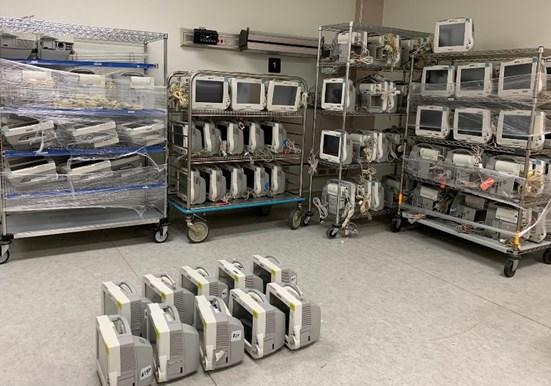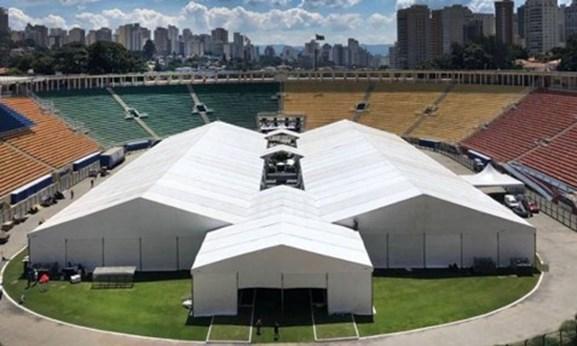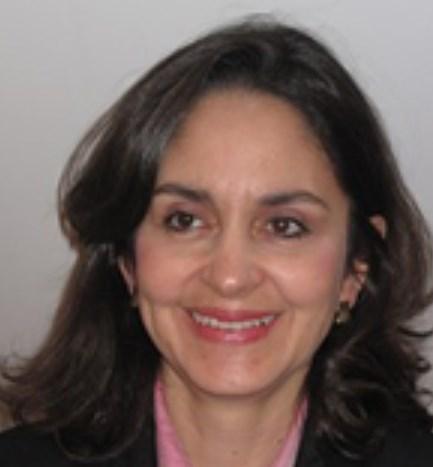
13 minute read
Focus on COVID-19
In this Issue:
In Memoriam: George Panagiotopoulos
IFMBE CED Update
Welcome New Members
CE Responses to COVID-19: KP
CE Responses to COVID-19: Brazil
ECRI Perspectives
CCE Prep: Sample Questions
CE Hall of Fame: Ray Zambuto
CE Hall of Fame: Adriana Velazquez
AAMI Update
International Committee Report
Education Committee Report
HTF Update
In-House CE Equipment Planner
ACCE News
May - June 2020, Volume 30, Issue 3
President’s Message

Ilir Kullolli, ACCE President
As the American College of Clinical Engineering approaches its 30th Birthday, it has been a great honor, joy, and (recently) challenge to serve as its president for almost a year. We started the year with some priorities and goals that were turned upside down over the last couple of months. We have had to cancel many of our planned events (HIMSS, AAMI, and various local gatherings) and in turn we lost a lot of exposure and some of the funds we had allocated to these events. While this could have been very damaging for any organization, due to the great effort and leadership from committee chairs, board members, and our Secretariat, we have been able to weather it and emerge even stronger. Before proceeding with the rest of the newsletter, I want to take a few moments to thank everyone who helped us through these difficult times:
• Education Committee and Symposium Planning members –Thank you for your efforts! You didn’t get discouraged when the events were canceled, but were able to put together many virtual events to help bridge the gap left by the cancellations!
Suly Chi (our Secretariat) –Thank you for your tireless efforts, hundreds of hours calling/ emailing committee members and sponsors, and for keeping everything on track and running!
Board members –Thank you for helping all of us keep it together and steady the ship during these strange times!
Our sponsors –Thank you for sticking around and for your flexibility and willingness to work with us on different solutions!
During the last couple of months ACCE has been very active in helping our members and Clinical Engineering/HTM professionals throughout the country and the world with resources on COVID-19 as well as being an advocate for our profession and professional rights. The International Committee has been active in signing cooperation agreements, as well as helping put together ACCE’s COVID19 web page with best practices from Italy, Argentina, Spain, Germany, Brazil, UK, and other countries. In addition, they have helped put together webinars with people around the world regarding equipment maintenance during COVID-19 (e.g., with Peru).
A few weeks ago, the Board of ACCE, decided to become more vocal around a major issue in our industry, The Right to Repair. We have partnered with US PIRG (Public Interest Research Group) to advocate for increased cooperation between original equipment manufacturers (OEMs), hospitalbased Clinical Engineering/HTM professionals, and independent service organizations (ISOs). We are actively engaging local CE/HTM organizations to speak up on the issue, while being engaged with US
In Memoriam: George Panagiotopoulos

George Panagiotopoulos, 1960-2020
It is with heavy heart that we announce the loss of one of the great clinical engineers of our time, George Panagiotopoulos. George passed away Sunday, May 24 2020 –just a few weeks after celebrating his 60th birthday. He is survived by his adoring wife, Dimetra, children Alexandra and Antonio, mother Magdalini, sister Alexandra, sister-in-law Angela, brother-in-law Michele, Kosta, and Kip, aunts, cousins, nieces and nephews in the San Francisco Area and Greece, and countless close friends and colleagues. What a gaping hole we feel for losing such a humble, valuable, and gifted son, brother, husband, father, uncle, cousin, friend and colleague.
We will always remember George for his calm demeanor, positive attitude, his passion for the clinical engineering profession, his great analytical mind, and his wealth of wisdom.
George started his career in banking working for Charles Schwab, but soon after he jumped into Clinical Engineering and found his calling. He worked for Kaiser Permanente in different positions regionally in Northern California, and the last few years nationally. George was an active member of American College of Clinical Engineering, he was a past Board member, helped with different Advanced Clinical Engineering Workshops, and presented at symposiums/ conferences on behalf of ACCE.
George had two favorite quotes; “Make the right thing easy to do” and “Live simply, give a lot, expect little”. And he lived his life by those two quotes!
Due to the San Mateo County Shelter in Place Order, we cannot gather together physically. However, a celebration of life will be held in the future.
In lieu of flowers, donations can be
George Panagiotopoulos, April 17, 1960—May 24, 2020
made to Holy Assumption Orthodox Monastery in Calistoga, CA, (Click here to donate) or the Annunciation Greek Orthodox Cathedral (Click here to donate).
CE Responses to COVID-19: Surge Planning for Kaiser Permanente: Re-opening a hospital and more
When St. Vincent’s Medical Center announced it would close its doors in January 6, 2020, there was no such thing as COVID-19 in the US. On April 7, 2020, California Governor Gavin Newsom announced the establishment of the Los Angeles Surge Hospital (LASH), a temporary facility that expands access to additional beds and increases ICU capacity for patients who contract COVID-1 9. Dignity Health and Kaiser Permanente are partnering with the State of California and the County of Los Angeles to open the facility, which will be located on the campus of the former St. Vincent Medical Center in central Los Angeles.
Supporting the new LASH is but one small example of the work that Clinical Engineers have had to do to help healthcare delivery systems throughout the world during this time of disaster. As Kaiser Permanente began planning for COVID19, all facets of the organization came together as one including but not limited to front line staff. Clinical Technology (Kaiser’s name for Clinical Engineering), and all its other support services set into motion the framework to ensure that all members needs, from Hawaii to Washington to Georgia, were met. KP CT helped lead the way for COVID19 surge planning. Marlene.Davis@kp.org
The previously closed and former St Vincent Medical Center in Los Angeles is being re-purposed as Los Angeles Surge Hospital by Kaiser And Dignity Health.



More CE Responses to COVID-19: Hospital Albert Einstein, Sao Paulo, Brazil
In Brazil, it all started very fast. In the CE Department we participated daily in the planning meetings and as soon as the first case was confirmed the hospital began working on case growth projections.
We quickly organized ourselves to plan our work on the various COVID -19 projects that all took place at the same time: expansion of ICU beds, creation of a field hospital, expansion of beds in the M'boi Mirim hospital, expansion of beds in Campo Limpo hospital and others.
We surveyed the medical equipment needed to meet the projected demand. We rearranged our planned activities, completed some preventive maintenance prior to its due date, and postponed others. We initially focused on planning activities with the purchasing department and soon the first new equipment began to arrive. That’s when the large volume of work really began. We divided ourselves into work groups; one focused on Morumbi and the other focused on external units and other partnerships.
In Morumbi we subdivided into two work groups. One team was responsible for receiving and fulfilling other activities such as unpacking, registering, testing and calibrating equipment. The other team focused on the installation of equipment, delivery of equipment and configuring connected equipment to the IT network.

The challenge was gigantic in all fronts. But the biggest concern was CE staff performance inside the patient rooms where the performance of the team needed to be fast, and very precise, and the support team needed to minimize the time inside the patient room while following all the protection protocols for the corona virus. We also had to establish some new protocols such as changing of soda lime and sterilization of the ventilatory subsystem of anesthesia equipment.
What about today? We hold daily meetings to monitor the evolution of cases and daily we plan the use and maintenance of equipment. Currently we are working to reestablish the "new normal" for the department.
Berthone Venancio Soares Coordinator, Clinical Engineering berthone.soares@einstein.br
The field hospital at Pacaembu Stadium, Sao Paulo, Brazil

Prepare to get certified in Clinical Engineering! ACCE 2020 CCE written exam review webinar series

Date: Wednesdays –August 12 through October 14, 2020 Time: 12:00PM –1:00PM (Eastern Time)
Faculty: Elena Buckley, Tobey Clark, Ted Cohen, Frank Painter
Registration Deadline: August 3, 2020
This 10-session series will be presented by ACCE Faculty who are CCEs. The class will be outline and present the material in each of the main subject areas covered on the exam. The course will help you identify areas in which you need further review and help you prepare for the CCE examination. Attendees will receive a copy of the new 2020 CCE Study Guide and a copy of the presentation material.
Congratulations to 2020 CE Hall of Fame Inductees: Ray Zambuto & Adriana Velazquez

Raymond Peter Zambuto, B.S. (EE), M.S. (BioE)
Ray Zambuto has been inducted into the Clinical Engineering Hall of Fame in recognition of his significant contributions to the advancement of the profession in three key areas: Ray co-founded one of the nation’s first shared clinical engineering services which helped to grow and expand the field of clinical engineering. He was also a prime driver of many of the clinical engineering initiatives in clinical systems engineering and the integration of medical and information systems, directly influencing the careers of many. Finally, Ray foresaw the vital importance of establishing strong relationships between CE and IT leaders in their respective professional organizations and became the driving force behind ACCE becoming a co-sponsor of and a key player in IHE's Patient Care Device Domain (PCD).
Ray entered the clinical engineering profession in 1968 and worked with some very prestigious engineers and physicians at some very significant hospitals and organizations. Early in his career he was drawn to cardiology and the technology that supported the science. Like many clinical engineers, Ray had the opportunity to be involved in the development of new technologies, such as the Counter Pulsation Balloon Pump, Thermodilution Cardiac Output, and Holter Monitoring. Intrigued with the field of com-

Adriana Velazquez Berumen, BSc (BME), MSc
Adriana Velazquez has been inducted into the Clinical Engineering Hall of Fame in recognition of her significant contributions to the advancement of the profession in several key areas. For many years Adriana has been an extremely influential advocate for clinical engineering all around the world and especially in underdeveloped countries. She has done this by relentlessly lobbying healthcare planners and clinical professionals at every opportunity on the benefits of clinical engineering to their patients.
Adriana was a clinical engineering consultant with the Pan American Health Organization (PAHO) from 1991 through 2000, where she worked closely with the health planners in PAHO's member countries educating them on the benefits of having access to clinical engineering services in their healthcare delivery systems and helping to establish the practice of clinical engineering in nine countries.
In her native Mexico, she was instrumental in creating its National Center for Health Technology Excellence (CENETEC) which quickly became a model for other countries. CENETEC's mission was to produce and disseminate information that would assist Mexico's healthcare providers by applying an evidence-based approach to medical device acquisition, use, and support.
From 2008 through today, Adriana has filled senior roles in the Essential Health Technology Department of the World Health Organization (WHO). She has been responsible for the development of 16 WHO books and publications on health technology management for use by governments and providers worldwide. The publications and the complementary educational programs she developed have covered all aspects of the acquisition, use and maintenance of medical technology; including recommendations on regulations, standards, nomenclature, policies, best practices, and implementation guides.
Some of the conferences she has organized have had attendance from over 100 countries. Adriana has created innovative tools (e.g., new websites, the aforementioned publications, regional workshops, collaborating centers, and a group of volunteer subject matter experts) for delivering critical clinical engineering guidance that can be scaled to help improve a region's application of health technology regardless of their location, size, or level of financial resources.
Much of what Adriana has produced at WHO finds its way into regulations and guidance adopted by ministries of health in many individual countries. One great benefit of this is that clinical engineering practitioners can point to credible documents from WHO that help enable them to justify resources and support that those practitioners will need to meet their own government standards.
From the desk of International Committee
The International Committee (IC) held two virtual meetings since our last report, one on March 20 and the other, May 11. Due to the COVID19 pandemic and consequent busy schedule for all IC members, these meetings were short and did not involve any guest speakers.
Because of an unfortunate schedule conflict, IC was not able to contribute with speaker(s) to the Argentina’s SABI conference in Uruguay, March 4-6, 2020. On the other hand, as the result of the collaboration and mutual assistance agreement with the Asociación Peruana de Ingenieros Clínicos (ASPIC), Binseng Wang delivered a webinar entitled “EvidenceBased Maintenance” supplemented with information on American CE efforts on COVID-19 on May 6. In addition, IC managed to complete another collaboration and mutual assistance agreement. The new collaborating organization is the Clinical Engineering Association of South Africa (CEASA), which has about 600 members. This is the 12th agreement signed since June 2019.
IC also exchanged information on COVID-19 efforts with the foreign associations listed below and acquired their permission to post their information on ACCE’s COVID-19 webpage: Italian association AIIC COVID-19 best practice, Argentinian society SABI COVID19 resources, Brazilian association ABEClin COVID-19 resources, and Spanish association SEEIC COVID-19 resources.
Slides were also presented by AIIC, SEEIC, German and British CE leaders on their COVID-19 efforts and experience in their joint webinar on April 29, 2020.
Due to the overwhelming response to the COVID-19 pandemic needed from Clinical Engineering in the U.S., especially in the Northeast where the upcoming webinar speakers are located, ACCE will be postponing the May and June educational webinars until July and August, respectively. We hope that you can understand the decision to delay these webinar sessions, as Clinical Engineering is playing a critical role in the COVID-19 preparedness, containment, and response efforts, during this unprecedented time. We hope that your schedules will offer more flexibility at these later dates to attend and more fully engage in these webinar sessions.
Education Committee Report
Due to the global pandemic and consequent cancellation of several international conferences that IC had originally planned to participate, IC will continue to refocus its efforts in holding webinars and virtual interactions with foreign organizations, as well as established additional collaboration and mutual assistance agreements. Hopefully next year it will be possible to join forces with foreign organizations in hosting in person events.

The June 11th webinar will be postponed to Thursday, August 13th at 12 –1 PM EDT.
ACCE hosted 2 complimentary webinars in April and May to its members:
On April 28: Medical Device Security Vulnerabilities and Disclosures. If you missed the live session, you can view the recording at https://accenet.org/ publications/Pages/Presentations.aspx.
On May 21: Celebrating the 2020 HTM week: Real-world Management of a Medical Device. If you missed it, you can view the presentation at https://accenet.org/ publications/Pages/Presentations.aspx .
Thank you to the speakers and moderators!

